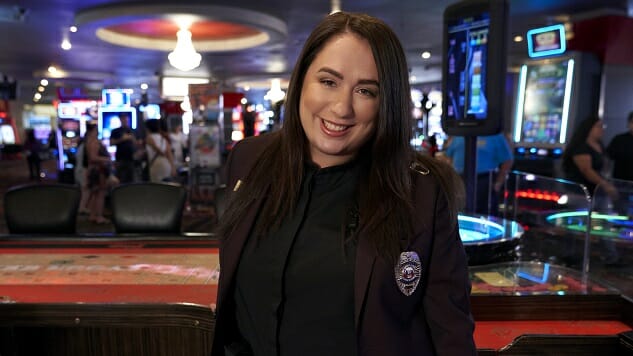Liza Treyger Demands That We Burn It All Down
Photo by Greg Gayne, courtesy of Netflix
Liza Treyger isn’t afraid of silence. In fact, she wants that silence to be punishing. That’s kind of the point.
On the New York comedian’s new special for Netflix’s The Degenerates, Treyger takes a brutally feminist approach to performance and audience engagement. In fact, it starts to leave stand-up behind entirely. It’s just a woman on stage venting the frustrations of an entire gender facing the current world-wide situation. It feels freeing within its context: the whole special is one part sexual liberation celebration and the rest is pointing a spotlight on how often women are murdered for just being women. It’s a comedy special that needs to exist right now in equal measure to how much we absolutely need this kind of show to not be necessary.
Treyger reaches out and implicates her audience, both in the room and at home, in everything from individual actions to national issues, and you can practically hear some of the men realizing they’re in over their head… even from a voyeur position. And the fact they stick around is fantastic. It makes for a special that is uniquely difficult to watch.
We talked to Treyger about her special, which is out on Netflix this week.
Paste: Let’s start with the real hard hitting questions: What’s your favorite Red Hot Chili Peppers song? You have a bit about having an embarrassing Red Hot Chili Peppers tattoo. Let’s see that through to the end.
Liza Treyger: It’s a later album but…. “On Mercury”? And “Otherside.” I was in seventh grade when that came out.
Paste: When that song came out I loved it because I’d just started playing guitar and knew already “Hell yeah, I can play that solo.”
Treyger: You were already better than them. I thought Anthony Kiedis was wild and sexy and when you’re young and reading his autobiography you just get so into him. I went back and listened to the old stuff but Californication onward is the good stuff. The older stuff just isn’t as rhythmically beautiful for my brain. Those slow and dramatic songs connected to me as an emo kid. Also, I love John Frusciante’s solo stuff.
Paste: It’s been three years since your album and special Glittercheese. What has changed or evolved about your sense of comedy and your style since then?
Treyger: The topics are all the same. The topics are still just about how Men Are Trash. But you can’t fake experience. I’m quicker and smarter now. I’m smarter and more myself. I haven’t changed. I’m just myself. I don’t spend a lot of time writing; I like to work stuff out on the stage. I don’t like to work too hard. So nothing has changed except experience. I’m just more controlled on stage and smarter. I, of course, hate this special. Because I focused on everything that I wish I could do better.
Paste: So many people that try to do crowd work in their specials crash and burn. You went above and beyond to demand a different level of investment from your crowd.
-

-

-

-

-

-

-

-

-

-

-

-

-

-

-

-

-

-

-

-

-

-

-

-

-

-

-

-

-

-

-

-

-

-

-

-

-

-

-

-








































